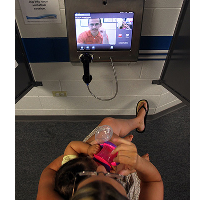Prisons Increase Profits by Replacing In-Person Family Visits with Video Screens
 Prison video visit (photo: Drew Nash, Twin Falls Times-News, AP)
Prison video visit (photo: Drew Nash, Twin Falls Times-News, AP)
Those in charge of the nation’s jails and prisons have found a way to make some money off the backs of those who can often least afford it—the families of inmates.
Telecommunications companies, last seen making huge profits off phone service for inmates, have had to find a new revenue stream since the Federal Communications Commission capped most jail phone rates. Now they’re installing video visitation systems at jails and prisons across the country, charging huge fees for their use and splitting the profits with the facility.
The new systems are touted as more user-friendly for families and better at restricting the flow of contraband into correctional facilities. But they come at the cost of high charges—up to $1.50 a minute—for remote video visiting.
“Seventy three percent of the people in our jail have not been convicted--that means they are innocent until proven guilty,” Dallas County Judge Clay Jenkins told NBC News. “And 100% of their family, their spouses and their children are innocent, who are the people who end up paying for this.”
Prisons often don’t start getting their share of the loot until the chat system has been paid for or until a certain level of calls are made each month.
Prisons have no incentive to make the charges affordable for families and some officials show a complete disregard for the cost. The purchasing manager for St. Clair County, Illinois, Tom Maziarz, told the St. Louis Post-Dispatch: “A dollar a minute strikes me as a fair price. I guess it depends what viewpoint you’re coming from. The way I look at it, we’ve got a captive audience. If they don’t like (the rates), I guess they should not have got in trouble to begin with.”
In some cases, a limited number of video chats are free but must be done at a central facility. One company, Securus, requires that jails and prisons that install its systems curtail in-person visits by all except attorneys and clergy. However, that often disincentivizes the use of such systems. A study by the Prison Policy Initiative reports that when traditional through-the-glass visits are retained, there is an average of 23 minutes of offsite video chats per month. When in-person visits are eliminated, that number falls to 13 minutes per month.
Whether done at a central site or remotely, video and sound quality of the chats are often poor, causing much of a pre-scheduled video conference to be wasted.
The systems also eliminate the personal contact between families and inmates that is credited with reducing behavior problems while incarcerated and recidivism after release. “It just seems so impersonal,” Ashika Coleman-Carter, whose husband was jailed in Travis County, Texas, told NBC News. “The old visits, even though you couldn’t touch behind the glass, at least you could go into an actual visiting room and see someone’s face. Now you can’t get close to the person at all.”
The video chats also provide less privacy for visitors with picture and sound being recorded and often reviewed by jail officials. In-person visits were usually in a separate room, but the video chats often take place in the dayroom of a jail. Sometimes family members watch while fights break out behind their loved one.
Attorneys are also troubled by the lack of privacy. “When I need to discuss with them issues germane to their defense or what a witness said…anything with substance, I’m not going to do it over the computer, because I don’t trust them,” Marci Kratter, a Phoenix defense attorney, told Al Jazeera America. “I’m a bit of a cynic, so I have concerns about whether what’s discussed over the Internet is actually privileged and that there’s not some way that they are recording it.”
She’s right to be concerned. Prisons in several jurisdictions have been sued by defense attorneys, charging their conversations with clients have been illegally monitored.
-Steve Straehley
To Learn More:
Screening Out Family Time: The For-Profit Video Visitation Industry in Prisons And Jails (by Bernadette Rabuy and Peter Wagner, Prison Policy Initiative)
Video Chats Replace In-Person Visits in U.S. Jails and Prisons (by Tim Gaynor, Al Jazeera America)
Prison Phone Companies Have Found Yet Another Way to Squeeze Families for Cash (by Tim Murphy, Mother Jones)
As Jail Visits Go High-Tech, Isolation Grows (by Lisa Riordan Seville, NBC News)
Arizona Begins Charging for Prison Visits (by Noel Brinkerhoff, AllGov)
- Top Stories
- Unusual News
- Where is the Money Going?
- Controversies
- U.S. and the World
- Appointments and Resignations
- Latest News
- Trump to Stop Deportations If…
- Trump Denounces World Series
- What If China Invaded the United States?
- Donald Trump Has a Mental Health Problem and It Has a Name
- Trump Goes on Renaming Frenzy






Comments